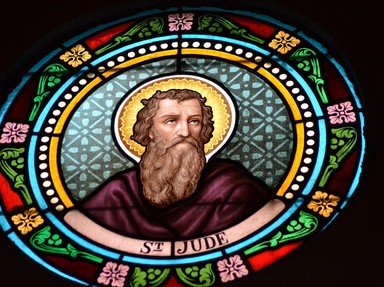Quiz Answer Key and Fun Facts
1. In the understanding of Protestant Christianity, who was Jude, most probably?
2. In verses 3-4, what does Jude say is his purpose in writing this letter?
3. Also in verse 3 (NKJV), how does Jude say the faith was delivered to the saints?
4. Jude says that the archangel Michael contended with the Devil. What did Michael say to him, according to the NKJV?
5. In verse 12 Jude says of the ungodly among the Church, "These are ___________ in your love feasts, .... serving only themselves." (NKJV text)
What word does Jude use? (You may answer either according to the KJV and NKJV, or according to the RSV, NIV and NAB)
6. Also in verse 12 Jude calls the ungodly among the Church 'clouds' - but, in the NKJV text, how does he describe these selfish 'clouds'?
7. In verses 14-15 Jude quotes a prophecy of Enoch, in which it is said that
the Lord will execute judgement upon all who are ____________,
in their being, their deeds, their manner and their speech.
In the NKJV text, what adjective is repeatedly applied to all of these aspects?
8. In verse 24, NKJV text, how does Jude say that God will present Christians 'before the presence of His glory'?
9. What verses contain the best-known part of Jude? (Even if people don't always know that the words are from Jude!)
10. According to verse 25 in the NKJV, what is due to God?
Source: Author
Rimrunner
This quiz was reviewed by FunTrivia editor
CellarDoor before going online.
Any errors found in FunTrivia content are routinely corrected through our feedback system.

